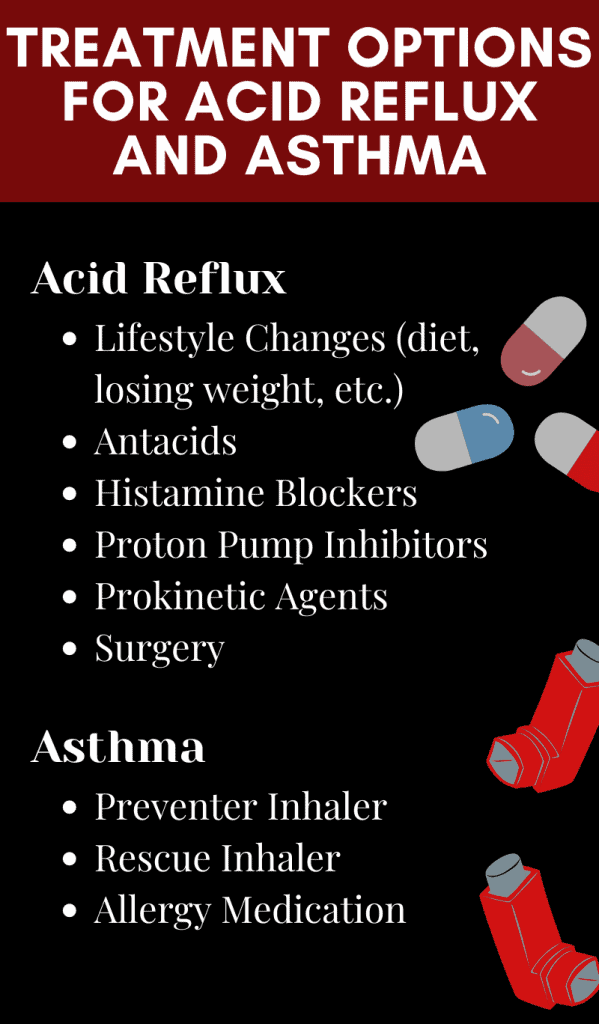Connection Between Acid Reflux and Asthma – Symptoms and Treatment
Posted by Prescription Hope - See Editorial Guidelines (Last Updated On: Mon Jul 10 2023)
It is estimated that about half of the children with asthma also have GERD, a severe kind of acid reflux. Acid reflux and asthma can also often occur together in adults too.
So, what is the connection between acid reflux and asthma? This article will attempt to uncover the relationship between these two conditions, along with the symptoms and management options for each. First, here is a quick summary to get us started.
Connection Between Acid Reflux and Asthma: Acid reflux and asthma often occur together, and each can exacerbate the other. The exact connection is not fully known. However, it has become clear that some asthma medications may worsen acid reflux.
Overview of Acid Reflux and Asthma
Before we get into the specifics around the potential connection between acid reflux and asthma, we need to give an overview of each condition.
Asthma
Asthma is a medical condition characterized by the narrowing and swelling of airways, making it difficult for individuals to breathe. This condition can be minor for some and a very serious condition for others.
There is no cure for asthma, but treatments are available to keep symptoms well controlled. These treatments often consist of preventer inhalers and rescue inhalers.

Acid Reflux
Acid reflux is sometimes referred to as gastroesophageal reflux disease (GERD). GERD is when stomach acid flows back into the esophagus. This can irritate the lining of the esophagus.
Many patients can manage acid reflux with certain lifestyle changes or by taking mild over-the-counter medicines. More severe acid reflux may require stronger prescription drugs or even surgery to ease the symptoms.
The Link Between Acid Reflux and Asthma
The link between acid reflux and asthma is actually twofold. Each can contribute to the worsening of the other. Let’s explore this further.
How acid reflux can trigger asthma
When a person experiences acid reflux and the stomach acid makes contact with the esophagus, it causes irritation. The esophagus does not have the same protective lining as the stomach, which explains the irritation.
When the acid comes in contact with the nerves of the esophagus, a chain reaction is set in motion. The nerves will send a signal to the brain, telling the brain to protect the airways from the acid. In order to keep the acid out, the airways tighten. Thus, the onset of asthma symptoms begins.
The second way acid reflux can trigger asthma is through the acid getting directly into the lungs. When this happens, the airways become irritated, leading to wheezing, coughing, and chest tightness.
How asthma can trigger acid reflux
Asthma may lead to increased acid reflux symptoms because of the medication you are using to treat your asthma. This is particularly true of theophylline (Elixophyllin, Theo-24, Theocron). Despite this, you should not change or stop taking your medication until you have consulted your doctor.
The second way asthma may trigger acid reflux has to do with the lower esophageal sphincter (LES). This is the muscle at the intersection of the esophagus and stomach. Asthma can cause this muscle to relax, which allows for stomach acid to flow back into the esophagus.
Symptoms of Each Condition
Symptoms of Acid Reflux
The most common symptoms of acid reflux may include:
- Heartburn
- Regurgitation
- Bloating
- Bloody vomiting
- Burping
- The feeling of having food stuck in your throat
- Persistent hiccups
- Nausea
- Unexplained weight loss
- Wheezing and hoarseness
- Dry cough
- Chronic sore throat
Symptoms of Asthma
The most common symptoms of asthma may include:
- Shortness of breath
- Chest tightness
- Coughing or wheezing
- Rapid breathing
Treating Acid Reflux and Asthma
Now that you have an understanding of the connection between acid reflux and asthma, let’s get into your possible treatment options for each condition.
Management of Acid Reflux
There are a few different treatment options for acid reflux that are relatively inexpensive and easy to come by.
First and foremost, changing up your lifestyle and diet may help acid reflux symptoms subside. For example, avoiding foods that will increase the amount of stomach acid present will help. Also, avoiding fatty foods and large meals can also be beneficial. Other lifestyle changes include losing weight, not lying down after eating, and quitting smoking.
Beyond lifestyle changes, over-the-counter medicines can help remedy acid reflux. The most popular medicine for infrequent symptoms is antacids. However, taking more antacids than what is needed can worsen your symptoms.
Other medications may include histamine blockers, proton pump inhibitors, and prokinetic agents. Some of these may be available over the counter, while others will require a prescription.

If prescription medications do not help with your acid reflux symptoms, then you may require surgery. The goal of the surgery would be to strengthen the anti-reflux barrier. This is often done by wrapping the upper portion of the stomach around the esophagus. Surgery is sometimes preferred by some individuals as it is more of a permanent solution.
Management of Asthma
Managing asthma is often done through the use of inhalers. There are two types of inhalers that you may need to make sure you receive the best treatment.
The first is a long-term inhaler, or preventer inhaler. These are inhaled corticosteroids that are used once a day to keep asthma symptoms from occurring.
The other inhaler is a quick-relief inhaler, or rescue inhaler. These inhalers contain fast-acting medications, such as albuterol. They work quickly to open up the airways to allow for easier breathing. Rescue inhalers should always be carried by the patient and used whenever they feel the onset of symptoms.
Depending on the severity of your condition, it may also be recommended that you take allergy medicine. This can help prevent certain allergens from triggering symptoms.
It is important to note that your doctor must evaluate you to determine your treatment needs. They will also be able to monitor your side effects and make changes to your treatment regimen as needed.
Conclusion
We hope this has given you a better understanding of the connection between acid reflux and asthma. Always consult your healthcare provider for any questions you have regarding your condition or the medication you are taking.
If you are having trouble affording your medication, then Prescription Hope may be able to help. The team here works directly with pharmaceutical manufacturers to provide patients with the medicines they need at a set, affordable cost. Enroll with us and start paying just $60.00 a month through Prescription Hope’s medication access service for each of your prescription drugs.
ENROLL



